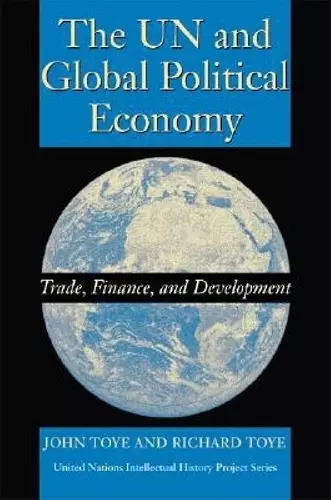The UN and Global Political Economy
Trade, Finance, and Development
Richard Toye author John Toye author
Format:Paperback
Publisher:Indiana University Press
Published:9th Jul '04
Currently unavailable, and unfortunately no date known when it will be back

A dramatic account of the UN's struggle over how best to understand severe inequities in the global economy.
Against the backdrop of a 20-year revolt against free trade orthodoxy by economists inside the UN and their impact on policy discussions since the 1960s, the authors show how the UN both nurtured and inhibited creative and novel intellectual contributions to the trade and development debate. Presenting a stirring account of the main UN actors in this debate, The UN and Global Political Economy focuses on the accomplishments and struggles of UN economists and the role played by such UN agencies as the Department of Economic (and Social) Affairs, the United Nations Commission on Trade and Development, and the Economic Commission for Latin America (and the Caribbean). It also looks closely at the effects of the Latin American debt crisis of the 1980s, the growing strength of the World Trade Organization (WTO) in the 1990s, and the lessons to be drawn from these and other recent developments.
John Toye (British political economist) and Richard Toye (history, Cambridge Univ., UK), a father-son team, examine, as part of the United Nations Intellectual History Project, contributions to development economics by the UN and its specialized agencies. They acknowledge that, despite high aspirations by some for the UN to be the principal international organization to promote economic development, its status in the field of finance, development, and trade became ancillary to that of the International Monetary Fund, the World Bank, and the World Trade Organization, which operate independently within the UN framework. The authors explain why the UN became marginal (inter alia, the Cold War, excessive demands by Third World countries, the Latin American debt crisis, and financial resources of the IMF and World Bank). The research output of a number of prominent economists in the UN's employ, however, left a lasting legacy to the trade and development debate. The substance of the research produced by these economists (e.g., Michal Kalecki, Nicholas Kaldor) during their UN service, and the historical, political, and bureaucratic setting in which the research was performed, is clearly and informatively summarized. Of special interest to students of economic development and trade policy and policy makers in these areas. Summing Up: Recommended. Public, academic, and professional library collections.
-- C. J. Siegman * formerly, Federal Reserve Board/International Monetary Fund , 2004dec CHOIISBN: 9780253216861
Dimensions: unknown
Weight: unknown
416 pages